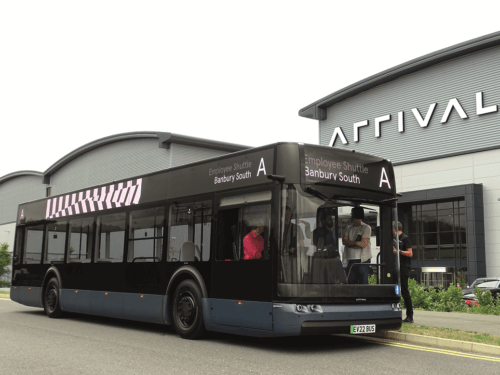Banbury-based tech firm Arrival has announced that it is to refocus operations away from home shores in order to pursue the potentially more lucrative US market
Arrival has announced a proposal that would see the company refocus its resources on the US market while further advancing its enabling technologies. Although it has achieved ‘critical milestones’ this year including Bus and Van certification in the second quarter and produced the first production verification Van in its Bicester microfactory, proving its production concept, the tech firm has seen its share price continue to fall rapidly over recent months.
In August, the company announced plans to use existing cash on hand of $513M plus funds available through a $300m At The Market (ATM) platform to deliver the first vehicles to UK customers this year, invest in hard tooling and launch its Charlotte microfactory in the USA next year. At the end of the third quarter of the year, the company reports that it had existing funds of approximately $330m cash on hand but due to the current share price and daily trading volumes, has not found the ATM to be a reliable source of capital. Scaling up production in the Bicester microfactory requires significant further investment in hard tooling and working capital and the company has determined that the benefits of such an investment would be best directed to the US market.
As a result, the company announced a plan to restructure its business to focus resources on a family of Van products for the US market as well as its enabling technologies – including core components, composite materials, mobile robotics, and software-defined factories. Arrival says it will continue to produce a small number of Vans in Bicester to optimise microfactory processes and support trials with customers.
Major factors in the company’s decision to shift focus to developing its US business included the tax credit recently announced as part of the US Inflation Reduction Act which is expected to offer between $7,500 to $40,000 for commercial vehicles, the large addressable market size, and substantially better margins.
The company plans toraise capital to fund the commercialisation of its vehicle programmes in the US and says it is exploring all funding and strategic opportunities needed to bring the Vans designed for the US into production at the company’s second microfactoy in Charlotte, North Carolina.
In order to extend the company’s cash reserve, Arrival says it plans to further ‘right-size’ the organisation and cut cash-intensive activities while continuing to advance its core technologies. The result of these proposals is expected to have a sizable impact on the company’s global workforce, predominantly in the UK. Bloomberg News reports that of the 2,000 employees, some 1,000 are based in the UK; a notable number of UK employees have announced their departure on LinkedIn in recent months, some being from the Arrival Bus development team.
The Bus was due to start undergoing trials with First Bus after gaining European type approval, but Arrival announced in August that it was to ‘suspend bus development’ and stated that ‘customer trials and investment in the Bus microfactory will continue once it secures additional capital.’ Asked about the delay at the time, a First Bus spokesperson said: “First Bus has worked alongside Arrival on this journey for some time and has been impressed with the product they have developed. We remain keen to reignite the relationship once Arrival’s bus programme has resumed, working together to support our commitment to operating a zero-emission bus fleet by 2035.”


